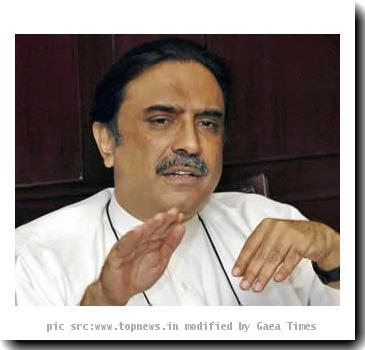Pakistan’s top court strikes down president’s judges appointment raising fears of instability
By Asif Shahzad, APSunday, February 14, 2010
Pakistan court order raises new instability fears
ISLAMABAD — A decision by Pakistan’s Supreme Court to strike down a presidential order appointing two top judges triggered warnings Sunday of a fresh conflict between the judiciary and the government that could lead to broader political instability.
President Asif Ali Zardari’s spokesman dismissed rumors the government was planning to declare a state of emergency after the court rejected his appointments at a special meeting late Saturday, just hours after they were announced.
The development will concern Pakistan’s Western allies who want the country to concentrate on battling al-Qaida and Taliban militants in the northwest. The stability of the nuclear-armed nation is also key to Washington’s hopes of defeating the insurgency just across the border in Afghanistan.
Zardari is already facing the prospect of legal challenges to his rule after the Supreme Court struck down an amnesty in December that had been shielding him from graft allegations dating back to the 1980s. Earlier last year, he was forced to reinstate the Supreme Court chief justice fired by former President Gen. Pervez Musharraf after demonstrations exposed his political vulnerability and the clout of the judiciary.
Saturday’s ruling came after Zardari appointed a new Supreme Court judge and chief of the Lahore High Court, going against the recommendation of the Supreme Court. Pakistan’s constitution says the president must consult with the Supreme Court over the appointment of new judges.
The court order said no consultation had taken place and Zardari’s appointments “appeared to be in violation of the provision of the constitution.”
Deputy Attorney General of Pakistan Shah Khawar said officials were summoned to appear Thursday to explain why the order had been issued against the court’s recommendations.
Information Minister Qamar Zaman Kaira said the president issued the order only after consulting the chief justice. “We have always acted constitutionally. We will take any step in future as required by the law and constitution.”
Some TV channels quoted government critics as saying the appointment of the judges could be used as the basis for a fresh challenge against Zardari’s hold on the presidency. Other media Sunday said Zardari may have to accept a humiliating backdown and agree to the court’s recommendations on the appointments, while also criticizing the court for escalating political tension in the country.
“Historically, clashes between these two institutions have led to disastrous consequences for democracy and constitutional continuity in the country,” the respected newspaper Dawn said in an editorial. “The fate of a high court judge here or a retired Supreme Court judge there should not hold the country’s political future hostage.”
Pakistan’s lawyers and judges have always played a role in the political life of the country. Protests by lawyers were credited with helping oust Musharraf.
While undertaking operations against militants in the northwest, the Zardari government had been widely criticized for failing to make a dent in the country’s major economic and social problems. Elements within the military are also believed to be angry at him for being too close to the United States and longtime foe India.
Meanwhile, a top Pakistan Taliban commander, Qari Hussain, claimed responsibility for twin suicide bombings last week outside a police station in the northwestern town of Bannu that killed 15 people. It was the latest of numerous attacks by militants on security forces over the past several years aimed at undermining the public’s confidence in the already-weak state.
Tags: As-pakistan, Asia, Asif Ali Zardari, Geography, Islamabad, Judicial Appointments And Nominations, Pakistan, South Asia

